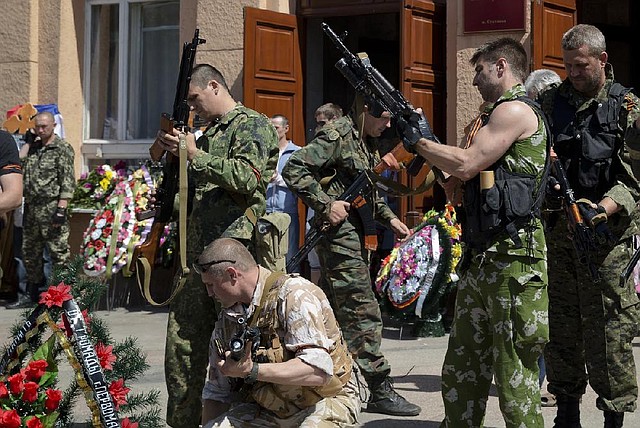Kiev fears for voting in east
Insurgents likely to block balloting, Ukrainian leaders say
Pro-Russian militants check their weapons during a funeral, attended by thousands, for five pro-Russian activists, Saturday, May 24, 2014, in the town of Stakhanov, eastern Ukraine. Five insurgents killed in a battle with Ukrainian forces near the city of Luhansk were buried on Saturday. The clash is one of several firefights between the two sides that have left at least 20 dead and some 300 injured, according to the Ukrainian Defense Ministry, days ahead of the country's presidential elections. (AP Photo/Vadim Ghirda)
Sunday, May 25, 2014
KIEV, Ukraine -- Pro-Russia insurgents are likely to prevent voting today in half or more of the election districts in the restive east, Ukrainian officials said.
Deputy Interior Minister Serhiy Yarovyi said Saturday that police are ready to ensure order and security at polling stations in just nine of the 34 districts in the east.
Earlier, Volodymyr Hrinyak, chief of the public security department at the Ukrainian Interior Ministry, said 17 out of 34 district election commissions in the Donetsk and Luhansk regions are not operating because their offices have either been seized or blocked by armed men. Hrinyak's update was reported by the Interfax news agency.
The insurgents have controlled parts of Ukraine for weeks. After their declaration of independence earlier this month, the insurgents pledged to derail the vote that they regard as an election in "a neighboring country."
They remain defiant, although Russian President Vladimir Putin said Friday that he is prepared to work with the election winner.
On Saturday, Putin again accused the West of ignoring Russia's interests in Ukraine, in particular by leaving open the possibility that the country could one day join NATO.
"Where is the guarantee that, after the forceful change of power, Ukraine will not tomorrow end up in NATO?" Putin said.
"We hear only one answer, as if on a record: Every nation has a right determine on its own the security system in which it wants to live, and that doesn't concern you," he said.
Russia has serious concerns that the new Western-leaning government in Kiev could take Ukraine into the U.S.-dominated military alliance. When Russia annexed Crimea in March, Putin said the decision was driven in part by the need to prevent NATO ships from ever being based on the Black Sea peninsula.
Putin said that he didn't believe a new Cold War had begun with the United States over Ukraine, but asserted that Russia had no intention of playing second fiddle to the West in global affairs.
"If the main bonus Russia gets is to sit in the room and listen to what other people are saying, then that is not a role Russia can agree to," Putin said. "We always take into account the interests of our partners ... but there are some lines that cannot be crossed, and Ukraine and Crimea were that line."
After the televised portion of the meeting with the international journalists, Putin proposed over dinner that a mediator be named to find a compromise between the Kiev government and those fighting for independence in the east. Putin suggested that the role be taken by Viktor Medvedchuk, who supported the ousted Ukrainian government and was among those hit by U.S. sanctions over the Russian seizure of Crimea. He would likely be unacceptable to the new Kiev leadership.
Acting Ukrainian Prime Minister Arseniy Yatsenyuk said in a televised address late Friday that the election will be the first step to stabilize the situation in the east.
"I would like to assure all my compatriots in the Donetsk and Luhansk regions who will be prevented from going to the polling stations by the war waged on Ukraine: The criminals don't have much time left to terrorize our land," Yatsenyuk said.
Leaders of various Christian churches as well as Muslim leaders gathered at Kiev's main cathedral, the St. Sophia Cathedral, to pray for peace and a free and fair election in Ukraine. Ukraine's interim president, prime minister, Cabinet ministers as well as lawmakers took part in prayers at the cathedral that dates back to the 11th century.
Filaret, patriarch of the Ukrainian Orthodox Church, said all churches in Ukraine on Saturday would be praying for peace because "Ukraine suffers from aggression of its neighbor to the north, Russia."
Twenty-one candidates are competing to become Ukraine's next leader. Polls show billionaire candy-maker Petro Poroshenko with a commanding lead, but short of the absolute majority needed to win in the first round. His nearest challenger is Yulia Tymoshenko, the divisive former prime minister who is far behind.
Most polls suggest Poroshenko would win a runoff ballot, which would be held June 15.
Fighting was reported Friday between pro-Russia separatists and government forces in eastern Ukraine as Kiev continued an offensive to try to halt the uprising.
Information for this article was contributed by Laura Mills of The Associated Press.
A Section on 05/25/2014

